|
|
|
Sort Order |
|
|
|
Items / Page
|
|
|
|
|
|
|
| Srl | Item |
| 1 |
ID:
077346
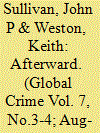

|
|
|
|
|
| Publication |
2006.
|
| Summary/Abstract |
Criminal-states and Criminal-soldiers are two interrelated threats that challenge order and stability at local, national, and potentially global levels. Policing and law enforcement are essential to securing the conditions necessary for stable governance and preserving the rule of law. Law enforcement and police services play key roles in ensuring community stability. They also control and contain criminal threats, protect individual liberties, and enable other political and diplomatic processes to function. This afterward examines the role of police and enforcement agencies in countering the threats posed by criminal-soldiers in order to prevent the establishment or spread of criminal-states.
|
|
|
|
|
|
|
|
|
|
|
|
|
|
|
|
| 2 |
ID:
093824
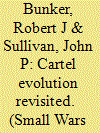

|
|
|
|
|
| Publication |
2010.
|
| Summary/Abstract |
Drug Trafficking Organizations (DTOs) - commonly called drug cartels - are challenging states and their institutions in increasingly brutal and profound ways. This is seen dramatically in Mexico's drug wars and the expanding reach of Mexican organized criminal enterprises throughout Latin America and other parts of the world. This essay updates a 1998 paper 'Cartel Evolution: Potentials and Consequences' and examines current cartel and gang interactions. The paper links discussion of cartel phases to gang generations; updates and applies the discussion of third phase cartel potentials to Mexico; and assesses four alternative futures for Mexico, as well as their cross-border implications for the United States.
|
|
|
|
|
|
|
|
|
|
|
|
|
|
|
|
| 3 |
ID:
188059
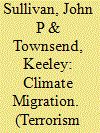

|
|
|
|
|
| Summary/Abstract |
While conflict, crime, and terrorism are persistent geopolitical and human security threats, climate change can be a threat multiplier, affecting geopolitical stability on local, regional, and global scales. This paper provides a qualitative assessment of the literature and geopolitical trends related to climate change, migration, and ethnocentrism in order to evaluate the current situation and future potentials for climate-driven conflict, crime, terrorism, and ethnocentric extremism. The paper concludes that as climate change becomes a major driver of environmental degradation, natural disasters, mass migrations, and urbanization, this will escalate the impetus for violence against migrants, the exploitation of migrants, and anti-migrant politics. Potential implications in terms of terrorism and extremism are discussed.
|
|
|
|
|
|
|
|
|
|
|
|
|
|
|
|
| 4 |
ID:
074373
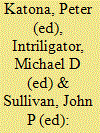

|
|
|
|
|
| Publication |
London, Routledge, 2006.
|
| Description |
xxiii, 300p.
|
| Standard Number |
0415384995
|
|
|
|
|
|
|
|
|
|
|
|
Copies: C:1/I:0,R:0,Q:0
Circulation
| Accession# | Call# | Current Location | Status | Policy | Location |
| 051781 | 363.32517/KAT 051781 | Main | On Shelf | General | |
|
|
|
|
| 5 |
ID:
093831
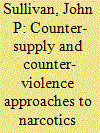

|
|
|
|
|
| Publication |
2010.
|
| Summary/Abstract |
Narcotics and the drug trade contribute to a range of social ills. Among these are social instability, violence, corruption, and a weakening of the state. A range of criminal enterprises, including transnational gangs and drug cartels are engaged in the global trade in illicit drugs. This essay looks at measures to stem this trade through interventions directed against the drug supply and efforts to limit the violence that results from the drug trade. As such it looks at 'counter-supply' and 'counter-violence' approaches. While it emphasizes the impact on the Western Hemisphere - the United States and Latin America - it has international implications for global and national security, intelligence, and law enforcement.
|
|
|
|
|
|
|
|
|
|
|
|
|
|
|
|
| 6 |
ID:
097399
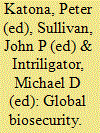

|
|
|
|
|
| Publication |
Oxon, Routledge, 2010.
|
| Description |
xxi, 318p.
|
| Standard Number |
9780415460538, hbk
|
|
|
|
|
|
|
|
|
|
|
|
Copies: C:1/I:0,R:0,Q:0
Circulation
| Accession# | Call# | Current Location | Status | Policy | Location |
| 055054 | 327.1745/KAT 055054 | Main | On Shelf | General | |
|
|
|
|
| 7 |
ID:
108344
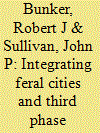

|
|
|
|
|
| Publication |
2011.
|
| Summary/Abstract |
This essay addresses and integrates 'feral cities' with 'third phase cartel' and 'third generation gangs' (3GEN Gangs) research. The feral cities diagnostic tool will be expanded from three levels (green, yellow, and red) to five (adding purple and black). This will be accomplished by means of the addition of two new levels that model the shift from ferality (de-institutionalization) to criminal re-institutionalization of urban social and political structures around new patterns of living. Such processes set the stage for the projected emergence of the BlackFor (Black Force) within the Americas. BlackFor represents a confederation of illicit non-state actors - essentially a postmodern form of societal cancer - linked together by means of a network of criminalized and criminal (narco) cities as are now arising.
|
|
|
|
|
|
|
|
|
|
|
|
|
|
|
|
| 8 |
ID:
077341
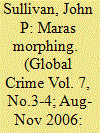

|
|
|
|
|
| Publication |
2006.
|
| Summary/Abstract |
Third generation street gangs are a crime and security problem in many global cities, internationally linked ethnic Diasporas, and cross-border regions where insecurity and criminal non-state actors reign. Widely known as third generation gangs (3 GEN Gangs), complex gangs operate with broad reach - often across borders - and can develop mercenary and at times political and potentially terrorist objectives. The typology of the three generations of gang evolution (based on the interaction of politicization, internationalization, and sophistication) is recounted, recent trends in transnational street and prison gangs are explored and future potentials are suggested.
|
|
|
|
|
|
|
|
|
|
|
|
|
|
|
|
| 9 |
ID:
060713
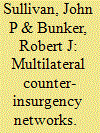

|
|
|
| 10 |
ID:
108343
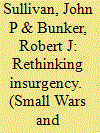

|
|
|
|
|
| Publication |
2011.
|
| Summary/Abstract |
Driven by globalization, Internet communications technology (ICT), and new economic forms the nature of states may be changing. Transnational criminal organizations (TCOs) - including what are commonly known as cartels - are early adopters to the new political/economic landscape. In addition to seeking to rule the illicit economy, criminal actors (networked cartels and gangs) are challenging states through high-order violence and leveraging nascent social/spiritual movements (narcocultura) to potentially usher in a new political dynamic. These violent non-state actors (criminal soldiers) are insurgent actors. They are waging new forms of insurgency - criminal and possibly spiritual - that have the potential to reconfigure states.
|
|
|
|
|
|
|
|
|
|
|
|
|
|
|
|
| 11 |
ID:
080711
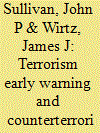

|
|
|
| 12 |
ID:
060705
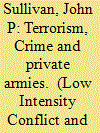

|
|
|
|
|
|
|
|